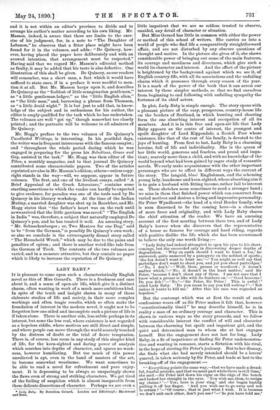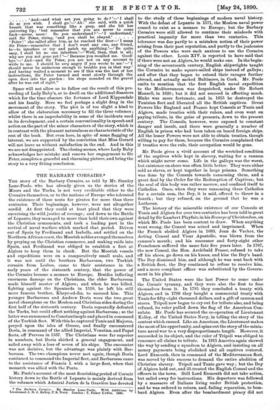LADY BABY.*
lv is pleasant to come upon such a characteristically English novel as this of Miss Gerard's. There is a freshness and ease about it, and a sense of open-air life, which give it a distinct charm, often wanting in work of a much more ambitious kind. In spite of the truth and insight shown in many of those elaborate studies of life and society, in their more complex workings and often tragic results, which so often make the foundation of interest in the modern novel, it ought not to be forgotten how one-sided and incomplete such a picture of life is if taken alone. There is another side, less subtle perhaps in its interest, but none the less real, where existence is not regarded as a hopeless riddle, where motives are still direct and simple, and where people can move through the world scarcely touched by the distress of doubt or the trial of fierce temptation. There is, of course, less room in any study of this simpler kind of life, for the keen-sighted and daring power of analysis which searches into depths of character, and spares no weak- ness, however humiliating. But too much of this power unrelieved is apt, even in the hand of masters of the art, to become somewhat wearisome. We want sometimes to be able to read a novel for refreshment and pure enjoy- ment. It is depressing to be always so unsparingly shown the flaws even of strong and striking characters. We get tired of the feeling of suspicion which is almost inseparable from these delicate dissections of character. Perhaps we are even a
• Lady Baby. By Dorothea Gerard. London and Edinburgh : Blackwood and Sone,
little impatient that we are so seldom trusted to observe, unaided, any detail of character or situation.
But Miss Gerard has little in common with either the power or method of this school of writers. She carries us into a world of people who find life a comparatively straightforward affair, and are not disturbed by any obscure questions of thought and motive. In the picture she gives of it, she shows. considerable power of bringing out some of the main features, its courage and manliness and directness, which give such a world its character and interest. And the effect of the picture
is heightened by the background against which we see it, of English country-life, with all its associations and the unfailing. charm which it possesses through every season of the year. It is a mark of the power of the book that it can arrest our interest by these simpler methods, BO that we find ourselves from beginning to end following with unfailing sympathy the-
fortunes of its chief actors.
In plot, Lady Baby is simple enough. The story opens with
a pleasant picture of the easy, prosperous, country-house life on the borders of Scotland, in which bunting and shooting form the one absorbing interest and occupation of all its. members. And it is in this free and open-air life that Lady Baby appears as the centre of interest, the youngest and spoilt daughter of Lord Kippendale, a Scotch Peer whose existence, like that of the rest of his family, is devoted to the joys of hunting. From first to last, Lady Baby is a charming heroine, full of life and individuality. She is the queen of her little world, generous and fearless, and proud and impa- tient; scarcely more than a child, and with no knowledge of the world beyond what had been gained by eager study of romantic novels. We early make acquaintance with the other important personages who are to affect in different ways the current of
the story. The languid, blasg Englishman, and the scheming young lady, handsome and keen-sighted, whose absorbing aim it is to gain a husband with fitting income, rather fail to interest us. These sketches seem sometimes to need a stronger hand ; we miss in them that finished power which can construct from varied motives and desires a living and impressive personality.
Sir Peter Wyndhurst—the head of a rival Border family, who is soon discerned to be the coming hero—is a character of more force and originality, and with Lady Baby shares the chief attention of the reader. We have an amusing account of the first meeting between these two, and of Lady Baby's horror when she discovers that the representative of a house so famous for courage and hard riding, regards with positive dislike the life which she has been accustomed.
to believe the only one worth living :—
" Lady Baby had indeed attempted to open his eyes to his short- comings, but she succeeded only in discovering deeper depths of degradation. Why on earth should I want to hunt a fox,' he answered, quite unmoved by a panegyric on the noblest of sports ; 'the fox doesn't want to hunt me.'—' You might as well say that partridges don't want to shoot you, and yet you shoot partridges.' —` No, I don't.'—` Well, then, grouse or woodcock ; it doesn't matter which.'—' No; it doesn't in the least matter,' said Sir Peter, because I don't shoot any of them. I am not sure that I know what a grouse is like with its feathers on.'—' Good heavens L Do you fish ?'—' No.'—' Sir Peter, Sir Peter ! This is awful!' cried Lady Baby. Do you mean to say you kill nothing ?'—` Not unless it wants to kill me.' After this his case was regarded as hopeless."
But the contempt which was at first the result of such confessions wears off as Sir Peter makes it felt that, however "constitutionally timid" he may describe himself, he is in reality a man of no ordinary courage and character. This is. shown in various ways as the story proceeds, and we follow with considerable interest the conflict of will and character between the charming but spoilt and impatient girl, and the quiet and determined man to whom she at last engages herself. But the engagement does not last for long. Lady Baby, in a fit of impatience at finding Sir Peter undemonstra- tive and wanting in romance, starts a flirtation with his rival, in the hope of stirring Sir Peter's jealousy. But to her dismay, she finds what she had merely intended should be a lovers' quarrel, is taken seriously by Sir Peter, and leads at last to the breaking-off of the engagement :—
" Everything points the same way,—that we have made a dread- ful, fearful mistake, and that we must part while there is still time,' she said.—Sir Peter laid down his cigar on the edge of the bench and looked her straight in the eyes. You wish me, then, to resign my claims ? '—'Yes; here is your ring,' and she began hastily pulling it off her finger. And you wish me to go away and not
to return ? Of course ; that is just what I wish. It is because
we don't suit each other, don't you see? So you have told me.' And—and what are you going to do ? '—'I shall do as you wish. I shall go.'—'Ali!' she said, with a quick breath that was something like a gasp, and she bit her quivering lip; but remember that you are never to come
back—never, never! Do you understand ? I understand,' said Sir Peter, rising, and you shall be obeyed.' 'Peter ! ' she called after him, as he reached the door= I mean Sir Peter—remember that I don't want any one, any friend, to—to interfere or try and patch up anything.'—' Be quite easy, I shall let no one interfere.'—' Well, then, that is all ;
why are you not gone yet ? Because you recalled me. Good- bye.'—' And—and Sir Peter, you are not on any account to write to me. I should be very angry if you wrote to me.'—' I should never be audacious enough to trouble you in that way.' And having waited a moment to see if this was the last of her instructions, Sir Peter turned and went slowly through the open door into the garden : his steps sounded on the gravel or he was out of sight."
Space will not allow us to follow out the result of this pro- ceeding of Lady Baby's, or to dwell on the additional disasters which for the time obscure the fortunes of Lord Kippendale and his family. Here we feel perhaps a slight drag in the movement of the story. The plot is of too slight a kind to allow of the elaboration necessary to fill the three volumes ; whilst there is an improbability in some of the incidents used in its development, and a certain conventionality in speech and action on the part of the minor characters of the story, which is in contrast with the pleasant naturalness so characteristic of the rest of the book. But even here, in spite of some flagging of interest, we are supported by the conviction that Miss Gerard will not leave us without satisfaction in the end. And in this we are not disappointed. The closing scenes, where Lady Baby acknowledges her mistake and renews her engagement to Sir Peter, complete a graceful and charming picture, and bring the
story to a very fitting conclusion.



































 Previous page
Previous page